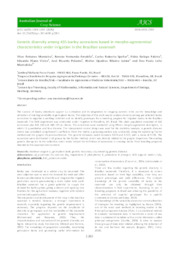Genetic diversity among 435 barley accessions based in morpho-agronomical characteristics under irrigation in the Brazilian savannah.
Genetic diversity among 435 barley accessions based in morpho-agronomical characteristics under irrigation in the Brazilian savannah.
Autoria: MONTEIRO, V. A.; AMABILE, R. F.; SPEHAR, C. R.; FALEIRO, F. G.; VIEIRA, E. A.; PEIXOTO, J. R.; RIBEIRO JUNIOR, W. Q.; MONTALVÃO, A. N. L.
Resumo: Abstract The success of barley (Hordeum vulgare L.) cultivation and its adaptation to cropping systems relies on the knowledge and utilization of existing variability in germplasm banks. The objective of this work was to analyse diversity among pre-selected barley accessions to organize a working collection and to identify genotypes for a breeding program for irrigated barley in the Brazilian Savannah. The field experiment was conducted under irrigation in Planaltina, DF, Brazil. The plant population consisted of 433 accessions plus BRS 180 and BRS 195 as checks. The accessions were evaluated using fifteen morpho agronomic descriptors, in which 11 quantitative and four discrete. The interpolated control design was used for the statistical analysis. A genetic distance matrix was calculated using Gower?s coefficient. From the matrix, a grouping analysis was conducted, using the optimizing Tocher method and the graphic dispersion distance. The genetic distances varied between 0.025 and 0.572, with a mean of 0.256. The accessions were distributed in 18 groups by the Tocher method, which was directly related to the graphic dispersion. The existing genetic divergence in the collection under study helped the definition of accessions in crossing blocks from breeding programs directed to the savannah environment.
Ano de publicação: 2020
Tipo de publicação: Artigo de periódico
Unidade: Embrapa Cerrados
Palavras-chave: Banco de Germoplasma, Genetic distance, Hordeum Vulgare, Plant genetic resources, Recurso Genético
Observações
1 - Por padrão são exibidas publicações dos últimos 20 anos. Para encontrar publicações mais antigas, configure o filtro ano de publicação, colocando o ano a partir do qual você deseja encontrar publicações. O filtro está na coluna da esquerda na busca acima.
2 - Para ler algumas publicações da Embrapa (apenas as que estão em formato ePub), é necessário ter, no celular ou computador, um desses softwares gratuitos. Sistemas Android: Google Play Livros; IOS: iBooks; Windows e Linux: software Calibre.
Acesse outras publicações
Acesse a Base de Dados da Pesquisa Agropecuária (BDPA) para consultar o acervo completo das bibliotecas da Embrapa.

